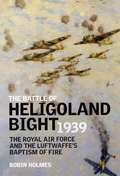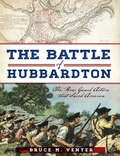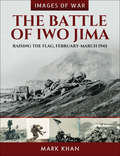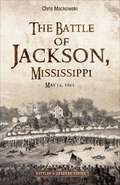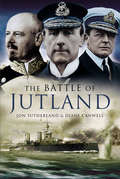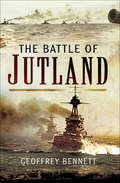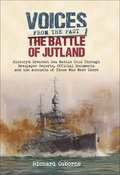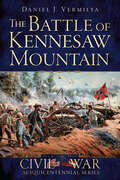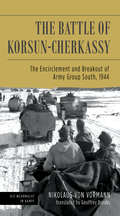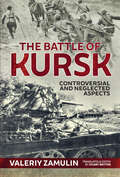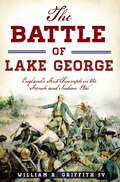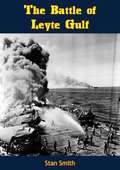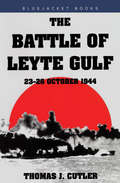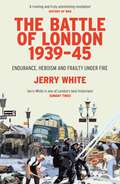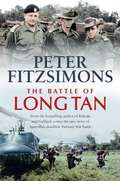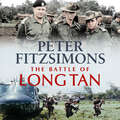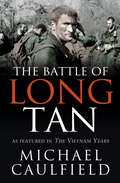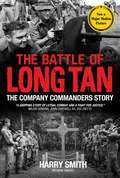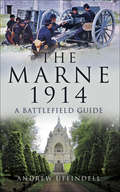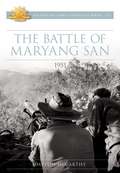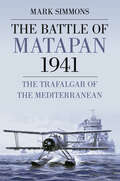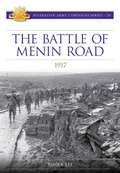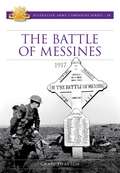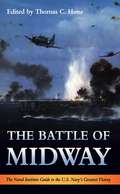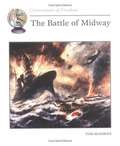- Table View
- List View
The Battle of Heligoland Bight 1939: The Royal Air Force and the Luftwaffe's Baptism of Fire
by Robin HolmesThis illustrated history chronicles the first British bombing raid of WWII and the early lessons learned about strategic bombing. On the 4th of September 1939, Squadron Leader Paul Harris led 149 Squadron to Brunsbüttel, Wilhelmshaven in a Vickers Wellington Mk. 1 medium bomber. On the way he ordered that the guns of his airplane be tested, only to make the horrifying discovery that not one of them worked. Though he was flying completely defenseless, he chose to press on. On the 18th of December, Harris flew to Wilhelmshaven once again and took part in the Battle of Heligoland Bight, the first major encounter between the Royal Air Force and the Luftwaffe. This time he flew a Wellington Mk.1A—codenamed &“R&” for Robert—and his guns were red hot and ready. Of all the Wellington bombers that fought the Luftwaffe, Paul Harris&’ old Wimpy is the only one left, preserved at the Brooklands Museum in Weybridge, England.
The Battle of Hubbardton: The Rear Guard Action that Saved America (Military Ser.)
by Bruce M VenterA detailed history of the Revolutionary War battle that saved the Continental Army and possibly America. British and German troops ran into stubborn rebel resistance at Hubbardton, Vermont, on July 7, 1777. The day would ultimately turn the tide for the Patriot cause. After capturing Fort Ticonderoga, the British, under Lieutenant General John Burgoyne, pursued a retreating Continental army under Major General Arthur St. Clair. In the fields and hills around Hubbardton, a tenacious American rear guard of about 1,200 derailed the British general&’s plan for a quick march to Albany. The British won a tactical victory, but they suffered precious losses. Patriots, under Colonel Seth Warner, Colonel Ebenezer Francis and Colonel Nathan Hale, left the British and Germans bloodied while also saving untold casualties from their own army. Burgoyne and his weakened force ultimately surrendered at Saratoga on October 17, 1777, paving the way for a French alliance with the colonies and American independence.
The Battle of Iwo Jima: Raising the Flag, February–March 1945 (Images of War)
by Mark KhanA pictorial history of the major WWII battle in which American Navy and Marine forces took the island of Iwo Jima from the Japanese Army.Just eight square miles in size, the Japanese island of Iwo Jima lies some 750 miles due south of Tokyo. Following a preparatory air and naval bombardment which lasted for many weeks, it was there, on the morning of Monday, 19 February 1945, that U.S. Marines launched Operation Detachment, their aim being the capture of the entire island and the three airfields that had been constructed on it.The Japanese defenders, however, were prepared. The enemy garrison had heavily fortified Iwo Jima with a network of bunkers, caves and dugouts, hidden artillery positions and more than ten miles of underground tunnels that proved difficult to locate and destroy. The following thirty-six days saw some of the bloodiest fighting of the Pacific campaign, resulting in more than 26,000 American casualties, including 6,800 dead. Of the 21,000 Japanese soldiers on Iwo Jima at the beginning of the assault, only 216 were taken prisoner during the battle.The capture of Iwo Jima, revealed here through a remarkable collection of archive images, was declared complete on the morning of 26 March 1945. The battle also resulted in one of the most iconic images to emerge from World War II—the raising of the American flag on the summit of Mount Suribachi. The Battle of Iwo Jima features images from the initial landings through the bitter fighting that followed for each yard of the island.
The Battle of Jackson, Mississippi: May 14, 1863 (Savas Beatie Battles And Leaders Ser.)
by Chris MackowskiJackson, Mississippi, was the third Confederate state capital to fall to Union forces. When Maj. Gen. Ulysses S. Grant captured the important rail junction in May 1863, however, he did so almost as an afterthought. Drawing on dozens of primary sources, contextualized by the latest scholarship on Grant’s Vicksburg campaign, The Battle of Jackson, Mississippi, May 14, 1863, offers the most comprehensive account ever published on the fall of the Magnolia State’s capital during Grant’s inexorable march on Vicksburg. General Grant had his eyes set not on Jackson but on Vicksburg, the “Gibraltar of the Confederacy,” the invaluable prize that had eluded him for the better part of a year. He finally marched south on the far side of the Mississippi River and crossed onto Mississippi soil to approach Vicksburg by land from the east. As he drove through the interior of the state, a chance encounter with Confederates at Raymond alerted him to a potential threat massing farther east in Jackson under the leadership of Gen. Joseph E. Johnston, one of the Confederacy’s most respected field officers. Jackson was a vital transportation and communications hub and a major Confederate industrial center, and its fall removed vital logistical support for the Southern army holding Vicksburg. Grant turned on a dime and made for Jackson to confront the growing danger. He had no way of knowing that Johnston was already planning to abandon the vital state capital. The Southern general’s behavior has long puzzled historians, and some believe his stint in Jackson was the nadir of his long career. The loss of Jackson isolated Vicksburg and helped set up a major confrontation between Federal and Confederate forces a few days later at Champion Hill in one of the most decisive battles of the war. The capital’s fall demonstrated that Grant could march into Jefferson Davis’ home state and move about with impunity, and not even a war hero like Joe Johnston could stop him. Students of Vicksburg will welcome this outstanding addition to the campaign literature.
The Battle of Jutland
by Diane Canwell Jon SutherlandThe Battle of Jutland was the greatest naval engagement of the First World War, if not any war. Admiral Scheer had adopted a policy of launching attacks against the British coast. What he did not know was that the British had broken his naval codes and that they knew of his plans. Consequently, when Scheer threw his entire fleet in a mission to attack the British mainland in May 1916, he could not know that the Royal Navy at Scapa Flow were underway.This is a fresh account of this greatest naval engagement, it offers fascinating insight into the events preceding the action, the tactics during the battle and the political and military fall-out. The book draws on released official records and personal accounts.Jellicoe failed to ensnare Scheer and the bulk of the German fleet which escaped battered, but intact. The Germans knew however that despite their great fleet, it was the Royal Navy that controlled the North Sea.
The Battle of Jutland (Pen And Sword Military Classics)
by Geoffrey BennettThe Battle of Jutland: At the end of May 1916, a chance encounter with Admiral Hipper's battlecruisers has enabled Beatty to lead the German Battle Fleet into the jaws of Jellicoe's greatly superior force, but darkness had allowed Admiral Scheer to extricate his ships from a potentially disastrous situation. Though inconclusive, at the Battle of Jutland the German Fleet suffered so much damage that it made no further attempt to challenge the Grand Fleet, and the British blockade remained unbroken. Captain Bennett has used sources previously unavailable to historians in his reconstruction of this controversial battle, including the papers of Vice-Admiral Harper explaining why his official record of the battle was not published until 1927, and the secret "Naval Staff Appreciation" of 1922 whose criticism were so scathing that it was never issued to the Fleet. Also included are numerous battle plans, photographs and an introduction by Bennett's son. 2006 is the 90th anniversary of the battle.
The Battle of Jutland: History's Greatest Sea Battle Told Through Newspaper Reports, Official Documents And The Accounts Of Those Who Were There (Voices from the Past)
by Richard OsborneThe Battle of Jutland was the greatest naval engagement of the First World War, if not any war. Admiral Scheer had adopted a policy of launching attacks against the British coast. What he did not know was that the British had broken his naval codes and that they knew of his plans. Consequently, when Scheer threw his entire fleet in a mission to attack the British mainland in May 1916, he could not know that the Royal Navy at Scapa Flow were underway.This is a fresh account of this greatest naval engagement, it offers fascinating insight into the events preceding the action, the tactics during the battle and the political and military fall-out. The book draws on released official records and personal accounts.Jellicoe failed to ensnare Scheer and the bulk of the German fleet which escaped battered, but intact. The Germans knew however that despite their great fleet, it was the Royal Navy that controlled the North Sea.
The Battle of Kennesaw Mountain (Civil War Ser.)
by Daniel J VermilyaThis Civil War history presents a lively and detailed study of one of the bloodiest and most important battles fought in Georgia. In the summer of 1864, Georgia was the scene of one of the most important campaigns of the Civil War. William Tecumseh Sherman&’s push southward toward Atlanta threatened the heart of the Confederacy, and Joseph E. Johnston and the Army of Tennessee were the Confederacy's best hope to defend it. In June, Johnston managed to grind Sherman&’s advance to a halt northwest of Atlanta at Kennesaw Mountain. After weeks of maneuvering, on June 27, Sherman launched a bold attack on Johnston's lines. The Confederate victory was one of the bloodiest days of the entire campaign. And while Sherman&’s assaults had a frightful cost, Union forces learned important lessons at Kennesaw Mountain that enabled the fall of Atlanta several months later.
The Battle of Korsun-Cherkassy: The Encirclement and Breakout of Army Group South, 1944 (Die Wehrmacht im Kampf)
by Nikolaus von VormannA primary source account of the WWII Battle of Korsun-Cherkassy written by a Nazi commander who survived the Soviet victory. In 1943, the tide began to turn against Germany on the Eastern Front. Their summer offensive, Operation Citadel, was a failure. The Red Army&’s Dnieper-Carpathian Offensive was pushing back on Germany&’s Army Group South in a war of attrition. By October, Kiev was liberated, and the Soviets had reached the Dnieper River in Ukraine. After sudden attacks by the 1st and 2nd Ukrainian Fronts, the Russians achieved a major encirclement of six German divisions, a total of 60,000 soldiers, in a pocket near the Dnieper River. A dramatic weeks-long battle ensued. After a failed attempt led by Erich von Manstein to break into the pocket from the outside, the trapped German forces focused their efforts on escape. Abandoning equipment and wounded soldiers, the survivors rejoined the surrounding panzer divisions. Beginning with the German retreat to the Dnieper in 1943, Generalleutnant von Vormann chronicles the battle and describes the psychological effects of the brutal combat. As one of the few primary source materials that exists on the subject, this volume is of significant historical interest.
The Battle of Kursk: Controversial and Neglected Aspects
by Valeriy ZamulinIn this book, noted historian of the Battle of Kursk Valeriy Zamulin, the author of multiple Russian-language books on the Battle of Kursk and Destroying the Myth: The Tank Battle at Prokhorovka, Kursk, July 1943: An Operational Narrative takes a fresh look at several controversial and neglected topics regarding the battle and its run-up. He starts with a detailed look at the Soviet and Russian historiography on the battle, showing how initially promising research was swamped by Party dogma and censorship during the Brezhnev area, before being resumed with the collapse of the Soviet Union. Zamulin then transitions to discussions of how the southern shoulder of the Kursk bulge was formed, preparations for the battle on both sides, and the size and composition of Model’s Ninth Army. He then examines such controversial topics as whether or not the II SS Panzer Corps was aware of the pending Soviet counterattack at Prokhorovka, and the effectiveness of the Soviet preemptive barrage that struck the German troops that were poised to attack. Zamulin also discusses whether or not General Vatutin, the Commander-in-Chief of Voronezh Front, erred when arranging his defenses. Zamulin also takes a look at how the myth of 1,500 tanks colliding on a narrow strip of farm fields became perpetuated in Soviet and foreign history books, when in fact it was impossible for the 5th Guards Tank Army’s tanks to attack in massive wave after wave due to the constrictions of the terrain. Zamulin also reveals incidents of the battle that were long kept “behind the curtain” by Soviet censorship. For example, the 183rd Rifle Division defending the Prokhorovka axis was repeatedly struck by friendly aircraft, and a Soviet tank counterattack overran the positions of one of its battalions. Zamulin discusses other cases of fratricide in the Voronezh Front, including the death of one of the 1st Tank Army’s foremost tank commanders in a friendly fire incident. In the process, he reveals that a wave of suicides swept through the junior command staff of the 5th Guards Tank Army immediately prior to the famous counteroffensive on 12 July 1943. All in all, Valeriy Zamulin with this collection of essays and articles, two of which have been reprinted from the Journal of Slavic Military History, makes a new contribution to our knowledge and understanding of this pivotal, epochal battle of the Second World War.
The Battle of Lake George: England's First Triumph in the French and Indian War (Military Ser.)
by William R. Griffith IVIn the early morning of September 8, 1755, a force of French Regulars, Canadians and Indians crouched unseen in a ravine south of Lake George. Under the command of French general Jean-Armand, Baron de Dieskau, the men ambushed the approaching British forces, sparking a bloody conflict for control of the lake and its access to New York's interior. Against all odds, British commander William Johnson rallied his men through the barrage of enemy fire to send the French retreating north to Ticonderoga. The stage was set for one of the most contested regions throughout the rest of the conflict. Historian William Griffith recounts the thrilling history behind the first major British battlefield victory of the French and Indian War.
The Battle of Leyte Gulf
by Stan Smith Rear-Adm. William H. BrockmanLEYTE!The eight-day series of battles that took place on land, sea and air over thousands of square miles in October 1944 has gone down in history as the time of decision in World War II. The men who were there recall it with one unforgettable word...Leyte! In the pages of this new book, many years in preparation, those days of glory live again.
The Battle of Leyte Gulf
by Thomas J. CutlerThe last great naval battle of World War II, Leyte Gulf also is remembered as the biggest naval battle ever fought anywhere, and this book has been called the best account of it ever written. First published in hardcover on the battle's fiftieth anniversary in 1994 and drawing on materials not previously available, it blends history with human drama to give a real sense of what happened--despite the mammoth scope of the battle. Every facet of naval warfare was involved in the struggle that engaged some two hundred thousand men and 282 American, Japanese, and Australian ships over more than a hundred thousand square miles of sea. That Tom Cutler succeeded at such a difficult task is no surprise. The award-winning author saw combat service aboard many types of ships during his naval career, and as a historian and professor of strategy and policy at the Naval War College, he has studied the battle for many years.Cutler captures the milieu, analyzes the strategy and tactics employed, and re-creates the experiences of the participants--from seaman to admiral, both Japanese and American. It is a story replete with awe-inspiring heroism, failed intelligence, flawed strategy, brilliant deception, great controversies, and a cast of characters with names like Halsey, Nimitz, Ozawa, and MacArthur. Such an exciting and revealing account of the battle is unlikely to be equaled by future writers.
The Battle of London 1939-45: Endurance, Heroism and Frailty Under Fire
by Jerry White'Endlessly fascinating. . . White is such a brilliant historian' Mail on SundayLasting for six long years, the Blitz transformed life in the capital beyond recognition, marking a time of almost constant anxiety, disruption, deprivation and sacrifice for Londoners. With the capital the nation's frontline during the Second World War, by its end, 30,000 inhabitants had lost their lives.While much has been written about 'the Myth of the Blitz', its riveting social history has often been overlooked. Unearthing what it was actually like for those living through those tempestuous years, Jerry White paints a fascinating portrait of the daily lives of ordinary Londoners, telling the story through their own voices.'As a history of the capital in wartime, it is probably unsurpassable' Sunday Telegraph'An impressive history of the capital at war. . . White, an accomplished chronicler of London's history, tells it with brio and a confident mastery of the sources' Literary Review
The Battle of Long Tan
by Peter FitzSimonsFrom the bestselling author of Kokoda and Gallipoli comes the epic story of Australia's deadliest Vietnam War battle.4.31 pm: Enemy [on] left flank. Could be serious.5.01 pm: Enemy ... penetrating both flanks and to north and south.5.02: Running short of ammo. Require drop through trees.It was the afternoon of 18 August 1966, hot, humid with grey monsoonal skies. D Company, 6RAR were four kilometres east of their Nui Dat base, on patrol in a rubber plantation not far from the abandoned village of Long Tan. A day after their base had suffered a mortar strike, they were looking for Viet Cong soldiers. Then - just when they were least expecting - they found them. Under withering fire, some Diggers perished, some were grievously wounded, the rest fought on, as they remained under sustained attack.For hours these men fought for their lives against the enemy onslaught. The skies opened and the rain fell as ferocious mortar and automatic fire pinned them down. Snipers shot at close quarters from the trees that surrounded them. The Aussie, Kiwi and Yankee artillery batteries knew it was up to them but, outnumbered and running out of ammunition they fired, loaded, fired as Viet Cong and North Vietnamese Army forces just kept coming. And coming.Their only hope was if Armoured Personnel Carriers (APCs) could reach them before they were wiped out. The APCs did their best but low cloud and thunderstorms meant air support was stalled. A daring helicopter resupply mission was suggested but who would want to fly that? The odds against this small force were monumental...By far the deadliest battle for Australian forces in Vietnam, the Battle of Long Tan has a proud place in the annals of Australian military history - and every ANZAC who fought there could hold his head high.Peter FitzSimons, Australia's greatest storyteller, tells the real story of this classic battle. He reveals the horror, the bravery, the wins and the losses that faced our soldiers. He brings to life the personal stories of the men who fought, the events leading up to that memorable battle and the long war that followed, and the political decisions made in the halls of power that sealed their fates. The Battle of Long Tan is an engrossing and powerful history that shows the costs of war never end.
The Battle of Long Tan
by Peter FitzSimonsFrom the bestselling author of Kokoda and Gallipoli comes the epic story of Australia's deadliest Vietnam War battle.4.31 pm: Enemy [on] left flank. Could be serious.5.01 pm: Enemy ... penetrating both flanks and to north and south.5.02: Running short of ammo. Require drop through trees.It was the afternoon of 18 August 1966, hot, humid with grey monsoonal skies. D Company, 6RAR were four kilometres east of their Nui Dat base, on patrol in a rubber plantation not far from the abandoned village of Long Tan. A day after their base had suffered a mortar strike, they were looking for Viet Cong soldiers. Then - just when they were least expecting - they found them. Under withering fire, some Diggers perished, some were grievously wounded, the rest fought on, as they remained under sustained attack.For hours these men fought for their lives against the enemy onslaught. The skies opened and the rain fell as ferocious mortar and automatic fire pinned them down. Snipers shot at close quarters from the trees that surrounded them. The Aussie, Kiwi and Yankee artillery batteries knew it was up to them but, outnumbered and running out of ammunition they fired, loaded, fired as Viet Cong and North Vietnamese Army forces just kept coming. And coming.Their only hope was if Armoured Personnel Carriers (APCs) could reach them before they were wiped out. The APCs did their best but low cloud and thunderstorms meant air support was stalled. A daring helicopter resupply mission was suggested but who would want to fly that? The odds against this small force were monumental...By far the deadliest battle for Australian forces in Vietnam, the Battle of Long Tan has a proud place in the annals of Australian military history - and every ANZAC who fought there could hold his head high.Peter FitzSimons, Australia's greatest storyteller, tells the real story of this classic battle. He reveals the horror, the bravery, the wins and the losses that faced our soldiers. He brings to life the personal stories of the men who fought, the events leading up to that memorable battle and the long war that followed, and the political decisions made in the halls of power that sealed their fates. The Battle of Long Tan is an engrossing and powerful history that shows the costs of war never end.
The Battle of Long Tan: As featured in The Vietnam Years
by Michael CaulfieldThe truth about the battle that came to define our Vietnam War - from the men who were there.18th August, 1966. 1pm?D Company entered the plantation. They thought that, if they were lucky, they were closing in on perhaps 30 or 40 VC. They were horribly wrong.Over twelve long, bloody and brutal hours, 105 Australian soldiers and three New Zealanders fought off mortar attacks and heavy machine-gun fire, unaware they were facing up to 2500 Viet Cong and North Vietnamese forces. The first major battle of the war for the Australians, our men showed extraordinary courage and, against all odds, they triumphed ? although the Vietnamese didn?t admit this for another forty years.In The Battle of Long Tan, Caulfield takes us through that hellish day in the Long Tan rubber plantation, combining gripping first-hand accounts from eleven of the men who fought with an authoritative overview of the battle itself ? from headquarters to the men in the field.This is as close as you?ll get to being there.Michael Caulfield has worked as a composer, musician, TV and film producer, and director. He was the executive producer of the ABC TV series AUSTRALIANS AT WAR. His books with Hachette Australia include THE VIETNAM YEARS, WAR BEHIND THE WIRE and VOICES OF WAR.
The Battle of Long Tan: The Company Commanders Story
by Harry SmithOn the afternoon of 18 August 1966, just five kilometres from the main Australian Task Force base at Nui Dat, a group of Viet Cong soldiers walked into the right flank of Delta Company, 6 RAR. Under a blanket of mist and heavy monsoon rain, amid the mud and shattered rubber trees, a dispersed Company of 108 men held its ground with courage and grim determination against a three-sided attack from a force of 2,500 Viet Cong and North Vietnamese Army troops. When the battle subsided, 18 Australian soldiers lay dead and 24 had been wounded. Battlefield clearance revealed 245 enemy bodies with captured documents later confirming the count at over 500 enemy killed and 800 wounded. These men were led by a gruff and gusty perfectionist, Major Harry Smith. Now, some 53 years after the battle, Harry tells his story. The Battle of Long Tan is more than just an account of a historic battle. Harry Smith takes his readers on an extraordinary journey — one that ultimately reveals a remarkable cover-up at the highest military and political echelons. The Battle of Long Tan is also Harry’s life story and portrays his many personal battles, from failed marriages to commando-style killing; from a horrific parachute accident through to his modern-day struggles with bureaucracy for recognition for his soldiers. Harry&’s battles are tempered by his love of sailing, where he has at last found some peace. The Battle of Long Tan portrays the wrenching, visceral experience of a man who has fought lifelong battles, in a story that he is only now able to tell. Harry can still hear the gunfire and smell the blood spilt at Long Tan. For him, the fight continues.
The Battle of Marne, 1914: A Battlefield Guide
by Andrew UffindellA traveler’s guide to the history and sites of the World War I battle in the Marne River valley in France.The First Battle of the Marne was one of the most pivotal battles in history. Fought outside Paris in September 1914, it turned the tide of the German invasion of France and robbed Kaiser Wilhelm II of his best chance of winning the First World War.The battle began when the French and British armies launched a massive counter-offensive, and it ended—after five, tense days of fluctuating fortunes—in a German retreat. The so-called “miracle of the Marne” was among the most crucial episodes of the war, and yet no complete, in-depth guide to the battlefield has been available until now in English.Andrew Uffindell begins his guidebook with a gripping account of the battle, followed by a series of easy-to-follow tours of the battlefield. Each tour covers a particular sector in detail, using vivid eyewitness accounts to reveal what the fighting was like for the men in the front line.This unique and highly illustrated book enables readers to explore the battlefield and retrace the course of those dramatic events for themselves. It gives directions to dozens of museums, cemeteries, and monuments, including the memorials to the famous “taxis of the Marne.” It will be fascinating reading for anyone interested in the Great War, and an essential companion for visitors keen to see the actual terrain over which the battle was fought.
The Battle of Maryang San 1951 (Australian Army Campaigns #23)
by Dayton McCarthyFor Australia, the Korean War marked its first foray as a minor power in the Cold War and it would be the first conflict to be fought by the newly formed Australian Regular Army (ARA). In this regard, the Army’s premier infantry organisation, the Royal Australian Regiment (RAR), received its baptism of fire in Korea and in the process, earned a number of battle honours for its regimental colours. This book describes the actions behind one such battle honour — the Battle of Maryang San. Over one week in October 1951 and as part of a wider divisional assault, the 3rd Battalion, The Royal Australian Regiment (3 RAR), manoeuvred across difficult terrain to dislodge and destroy Chinese forces three times its number. As such, Maryang San is widely regarded as one of the RAR’s and the Australian Army’s greatest battlefield accomplishments. Author Doctor Dayton McCarthy combines academic rigour with his experience as a professional infantry officer to analyse the battle and produce an account for the general reader and military professional alike. Using official histories, brigade and battalion war diaries as well as personal accounts, McCarthy seeks to provide not only the strategic, operational and tactical context, but also the ‘how’ and the ‘why’ of the battle. Although the battle itself had no lasting impact on the course and outcome of the Korean War, it demonstrated a number of key attributes that make it worthy of professional study such as the use of ground, small unit leadership, integration of combined arms and the role of aggression in close combat. Conversely, the conduct of the battle and its immediate aftermath highlight the enduring nature of war, including friction and the ‘fog of war’ as well as the truism that the enemy must never be discounted.
The Battle of Matapan 1941: The Trafalgar of the Mediterranean
by Mark SimmonsIn March 1941, the Royal Navy scored one of the greatest one-sided victories against the Italian Fleet the Regia Marina at Matapan. It brought to an end six months of remarkable success for the Royal Navy in the Mediterranean. When France fell and Italy declared war on Britain, Admiral Dudley Pound had wanted to evacuate the Mediterranean altogether and concentrate on home defence. Churchill overruled him, regarding such a move as the death knell of the British Empire. His decision made the Mediterranean theatre the focus of British land operations for four years, reliant on the Navy. In Admiral Andrew Cunningham, Churchill had a fleet commander in the Mediterranean who would miss no chance of hounding the enemy. Affectionately known as A.B.C. by his men, Cunningham was salty in his language, intolerant of fools and a master of tactics. In "The Battle of Matapan 1941: The Trafalgar of the Mediterranean", Mark Simmons explores the remarkable victories of Taranto and Matapan, as seen through the eyes of the men who manned the ships and flew the aircraft of the Mediterranean Fleet.
The Battle of Menin Road 1917 (Australian Army Campaigns #20)
by Roger LeeThe Passchendaele Campaign of 1917 is associated with images of slimy, oozing mud: mud deep enough and glutinous enough to drown men, horses and equipment, mud so pervasive that it, rather than the enemy, defeated the British Army’s only major campaign in Belgium. While these images are certainly true for the opening and final months of the campaign, mud was not he defining experience for the infantry of the Australian First and Second Divisions when, for the first time in history, two Australian Divisions fought a battle side by side in the Battle of Menin Road. For them, the defining experience was a well planned, well-conducted attack that saw all the objectives achieved in very short time. Menin Road was the third of the series of battles that together made up the Passchendaele (Third Ypres) Campaign. Intended to capture the high ground of the Gheluvelt Plateau east of Ypres to protect the right flank of the British Army advancing to its north, it was a difficult assignment. Earlier British attempts to clear the Plateau had been repulsed with heavy losses. With overwhelming artillery and air support, sound preparation and with limited objectives, the attack on 20 September surpassed all expectations. It was a classic example of how well-prepared and well-supported infantry could take and hold ground. However, as is explained in the book, it was also a classic example of why this operational method was too slow and would never win the war on the Western Front.
The Battle of Messines 1917: 1917 (16pt Large Print Edition) (Australian Army Campaigns Series #18)
by Craig DeaytonOn 7 June 1917, the British Second Army launched its attack on Messines Ridge, detonating 19 giant mines beneath the German front-line positions. By the end of the day, one of the strongest positions on the Western Front had fallen, a place of such importance that the Germans had pledged to hold it at any cost. It was the greatest British victory in three years of war. The first two years of the First World War had represented an almost unending catalogue of disaster for the Australians. Messines was not only their first real victory, it was also the first test in senior command for Major General John Monash who commanded the newly formed 3rd Division and would later be hailed as Australia&’s greatest soldier. Messines was a baptism of fire for the 3rd Division which came into the line alongside the battle-scarred 4th Australian Division, badly mauled at Bullecourt just six weeks earlier in one of the worst defeats of the war. The fighting at Messines would descend into unimaginable savagery, a lethal and sometimes hand-to-hand affair of bayonets, clubs, bombs and incessant machine-gun fire, described by one Australian as &‘72 hours of Hell&’. After their string of bloody defeats over 1915 and 1916, Messines would be the ultimate test for the Australians.
The Battle of Midway
by Thomas C. HoneThe best way for today's sailors to learn about a battle is from those who fought it. The Battle of Midway, commemorated annually in the U.S. Navy, warrants close attention. This Naval Institute guide includes some of the most vibrant and informed accounts by individuals who fought on both sides of the June 1942 battle. The anthology pulls together memoirs, articles, excerpts from other Naval Institute books, and relevant government documents to help readers understand what happened and explain why the battle was so significant to the naval service. The core of the book focuses on events leading up to the battle and the battle itself, with a separate section examining how others have interpreted the battle's often desperate engagements. When the U.S. Navy stopped the Japanese steamroller off Midway Island, it not only turned the progress of the war but set the Navy's foundation for future counter offensives. The Navy's comeback spread led to the Solomon Islands and on to the other key strategic areas in the Pacific. While many know that Midway was a crucial American victory, they often do not know the details of the battle. This book tells how, for example, the American PT boats contributed to the victory, how the carrier planes formed up for their attacks, and what role radar played in the battle. In addition to excerpts from books and articles, the guide includes selections from several important Naval Institute oral histories. From the enlisted man's perspective all the way to the admiral's, for both Americans and Japanese, readers see the U.S. Navy's greatest victory as the participants saw it.
The Battle of Midway (Cornerstones of Freedom)
by Tom McgowenDescribes a pivotal battle during World War II on the Pacific island of Midway.
